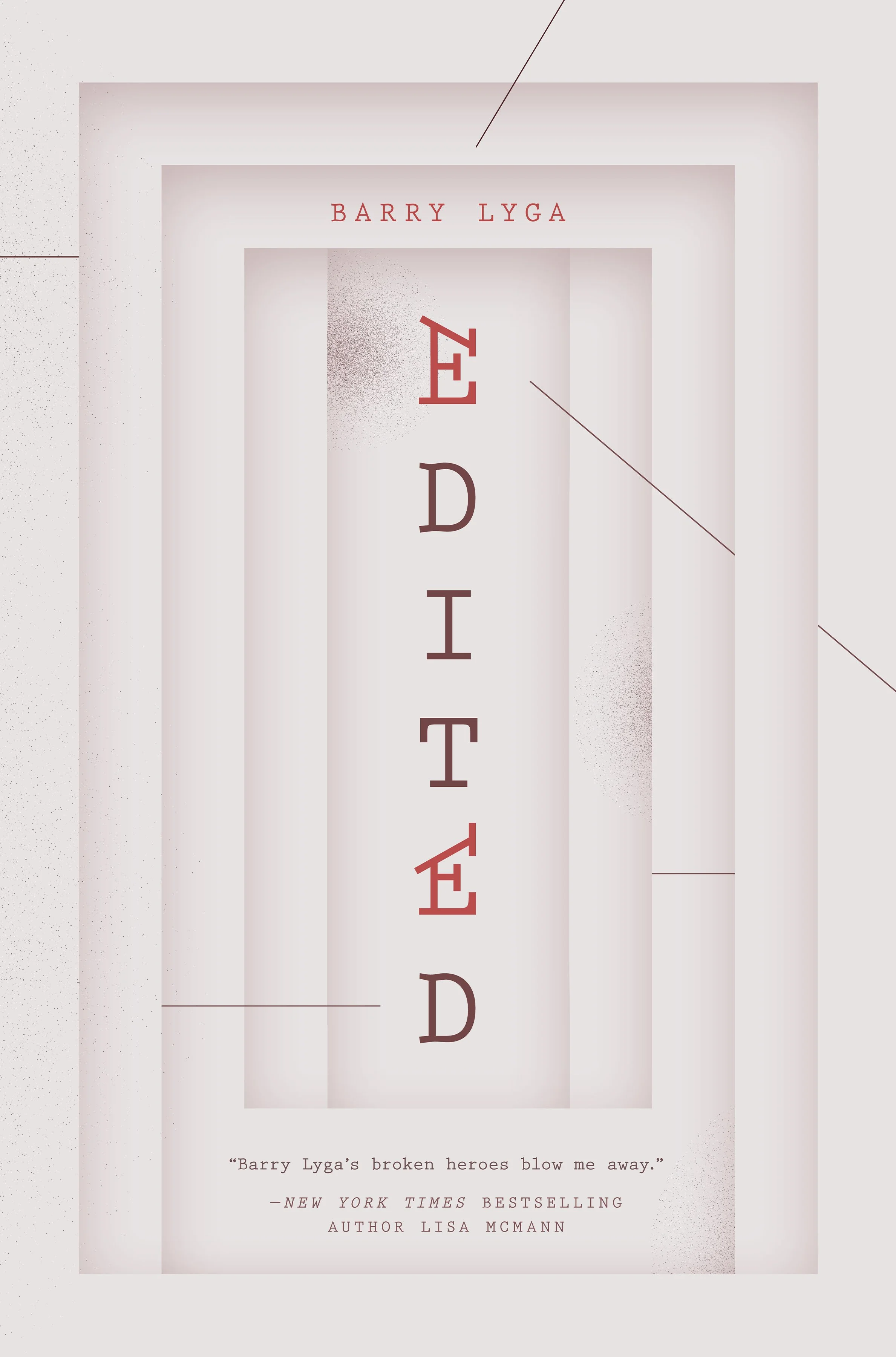Spotlight: Edited by Barry Lyga
/In the spirit of Stranger Than Fiction, New York Times bestselling author Barry Lyga takes the reader on a wild and surreal ride through the heart of his own creation—perfect for fans of A. S. King, Andrew Smith, and Jeff Zentner.
What starts as a love story between two teens—whose crumbling relationship coincides with a crumbling reality—ends up as a journey toward their creator, Barry Lyga, in a love story about creation itself.
This is a love story.
Mike loves Philomel. Always.
Philomel loves Mike. Sometimes.
After doing something stupid that drives away the love of his life, Mike begins to notice that the world itself seems to be suffering the aftereffects of his bad decision. Reality as he knows it has … changed. And before he can fully understand the ramifications, he’s on an odyssey unlike any other, trying to figure out how to repair the universe and return his lost Philomel to his side. It’s not time travel. It’s not dimension-hopping. It’s something deeper and more fundamental, as simple and as complex as ink on paper. And much to Mike’s surprise, this isn’t even the whole story. It’s possible that the missing pieces of Mike’s life may end up being the most important part of his world—and beyond, the solution to fixing not only his love life, but the entire universe.
Excerpt
Prologue:
The moment I realized I could edit reality.
I was in the auditorium, at the dance, staring at Phil—at her dress, her teal dress, the dress teal and very definitely not red.
Phil stared back at me. Her eyes were narrowed to slits, as though against sunlight—even though it was twilight dark, the lights low in that prom-esque way. We were not, of course, attending a prom. This was a charity event. But the light was prom-esque in any event.
“What’s wrong with you?” she asked.
“Your dress . . .”
“I didn’t wear it for you. I know it’s your favorite, but that’s not why I—”
“No,” I said. “That’s not what . . .” Could no one tell? Did no one notice? I turned to George. “George. What was I just saying when she came in? About her dress?”
George blinked. “Uh, you said . . . uh . . . You said, ‘I’m glad she wore the teal. That’s the best one for her hair color—’”
“This is for charity,” Phil interrupted. She was avoiding my eyes now. Her voice was tense. “Maybe it’s best if we don’t talk or hang out while we’re both here.”
And then he came in. He had the good grace to pause at the door before approaching us. His face was a melting pot of anger, shock, and some distant relative of resignation.
“Is there a problem?” he asked.
George stepped between us, a faithful wall of sanity.
“Dude, I don’t think there’s a problem,” George said.
Then George puffed out his chest, a truly hilarious sight to those who knew him only by sight. But of course, to those who knew the Legend of George (nearly everyone in the auditorium, including him) the chest puffery was anything but hilarious. I truly believe he would have punched George in the face, given the testosterone and rage in his eyes . . . if not for Phil.
“For charity,” she insisted, now interposing herself between George and him, so that we formed a strange sort of set of interlocking aggressions: George between him and me, also between Phil and me, Phil between George and him, me still staring at Phil’s teal dress (teal!). “This isn’t going to turn into some bullshit macho thing. Jesus, Mike. Do you think getting into a fight is going to win me back?”
A fight was, indeed, a possibility I’d considered. I’d never been in a fight. But I could evoke a universe in which I viciously battered him into submission. I would win back Phil like a prizefighter wins a belt, not caring—in the throes of that fancy—that by doing so I reduced her to an object. No, in the throes of that fancy I would care only about having her back.
“No one’s going to fight,” I said.
And in saying it I became convinced it was not only true, but would remain true.
He took Phil’s hand, escorting her past George, past me.
I watched them go. Phil did not look over her shoulder, though he did, his expression now a grotesque mating of still-simmering anger and boiling-over self-satisfaction. I briefly savored the image of my fist in his face—repeatedly.
“Dude, I’m proud of you,” George said.
I blinked at him. Then I sniffed. “Do you smell chocolate syrup?” I asked. Because I smelled chocolate syrup. I also realized, in that moment, that I had actually been smelling it since Phil had entered the auditorium and changed dresses without ever being naked.
George was staring at me now. “Are you all right?”
“No. No. Something is . . .” I could not put “something” into words. It had begun with the strong reek of chocolate syrup upon Phil’s entrance—beautiful but somehow wrong in the red dress—followed by my wish that she’d instead worn the teal dress . . . followed by her not only wearing the teal dress, but also having always worn the teal dress.
But . . . no. It had not begun there.
It had begun moments after that, with my realization that I could, in fact, edit reality—when I decided that Phil had, in fact, worn the red dress . . . the one her mother had bought for her to wear not to a prom-esque charity event, but to the prom itself.
I hated that dress.
That warm afternoon, one May previous, I caught myself scowling in Phil’s full-length mirror. She’d just draped her mom’s gift over her body. She caught my scowl, too. After unzipping herself free, her cute little yellow-and-white-patterned sundress shushing to the floor, she smirked, then dipped herself in the flimsy red fabric.
“Zip me,” she said, and I stood.
I zipped the red dress, going slowly, one palm pressed to her lower back as though for support. In reality I took (and would take) any opportunity to touch her, any part of her, because every part of her was (and is) sexy. But Phil’s sexiness didn’t help the dress.
“I don’t like it,” I confessed.
She posed and twisted and turned and posed again in front of the full-length mirror.
“It’s not quite right,” she admitted.
With that memory bright and clear in my mind, I decided that, yes, Phil had in fact worn the hated red dress to the charity auction. Moreover, she had, in fact, always worn it, and had never worn the delightful teal dress.
Across the ballroom, he guided Phil onto the dance floor as the DJ obligingly spun up a slow dance number, and Phil molded her body to his, molded her red-bedressed body to his, and swayed—the way she’d molded and swayed against me at our prom, only a year ago. My mouth turned Sahara; the tips of my fingers vibrated. The stench of chocolate syrup became overwhelming, strong and overly sweet.
“George.” My voice sounded unlike my own, resonated throaty and vaporous. “George, look over at Phil.”
“Dude. Please. Give it up. She’s moved on. She’s with him now, okay?” (He did not actually say him. He said instead his name—which I refuse to see or hear or record. My revenge, though small.)
Somehow he’d also managed to procure a half Diet Coke, half lemonade.
“Look at her dress, George.”
“Dude, what about it?”
In the space of minutes, in the time from her entrance until now, Phil’s dress had gone from relationship-souring red to fondly remembered and complementary teal and back again. And only I had noticed.
I could not speak. I stole George’s half Diet Coke, half lemonade and drained the glass by half its remainder, thinking of Zeno and Achilles and a tortoise for a moment.
“George.” I gasped. “Do you remember when Phil came in? What I said?”
“Sure. You said, ‘The red one is all wrong. She should have worn the teal.’”
I decided that Phil had worn the teal dress after all.
On the dance floor, she remained fused to him . . . in her teal dress. Less than a moment earlier, the dress had been red.
George reached for his drink, but I ducked away and took another swig.
“Say it again,” I commanded. “Tell me what I said when she came in.”
He rolled his eyes. “Dude, the music isn’t that loud. You said, ‘I’m glad she wore the teal—that’s the best one for her hair color.’”
Phil had worn the red, and had worn the teal—and not only that, she had always worn the red, and had always worn the teal. Only I noticed the difference in the always. So I thought about how it all started. I thought about the beginning.
I imagined it as the first chapter in my story, though of course it wasn’t.
From Edited by Barry Lyga. Used with the permission of the publisher, Blackstone Publishing. Copyright ©2022 by Barry Lyga.
About the Author
Barry Lyga is the author of The Astonishing Adventures of Fanboy and Goth Girl, Boy Toy, Goth Girl Rising, and the I Hunt Killers series, among others. He lives in New York City. Or Baltimore. Or New Jersey. Or, possibly, Edinburgh. Or somewhere he hasn’t imagined yet. It all depends on when you’re reading this book. In fact, he might not live in any of those places, or he could even be dead by now.

















































